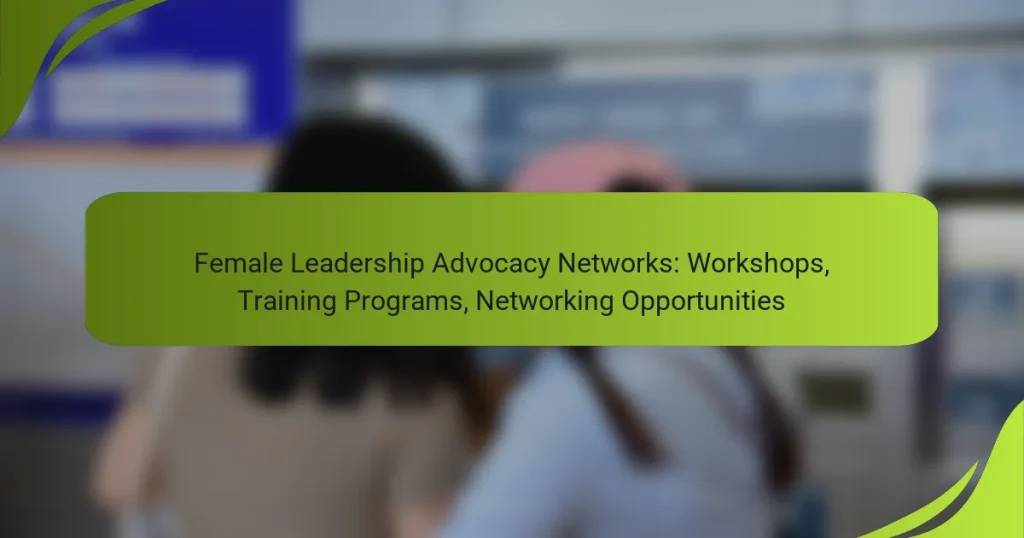Female leadership advocacy networks play a crucial role in empowering women through targeted workshops, training programs, and networking opportunities. These initiatives are designed to enhance essential skills, provide mentorship, and foster a supportive community, enabling women to thrive in leadership roles. By connecting female leaders with valuable resources and connections, these programs facilitate collaboration and knowledge sharing, ultimately advancing their careers.

What are the best workshops for female leadership advocacy?
The best workshops for female leadership advocacy focus on developing skills, networking opportunities, and fostering a supportive community. These programs often provide practical training, mentorship, and resources tailored to empower women in leadership roles.
Women in Leadership Workshop by Catalyst
The Women in Leadership Workshop by Catalyst is designed to enhance leadership skills among women through interactive sessions and peer networking. Participants engage in discussions about challenges faced in the workplace and develop strategies to overcome them.
This workshop typically includes case studies, role-playing exercises, and expert panels, making it a practical choice for women looking to advance their careers. It is often held in various locations across the U.S. and may also be available virtually.
Leadership Development Program by Lean In
Lean In’s Leadership Development Program focuses on empowering women to take on leadership roles through structured learning and community support. The program includes workshops that cover essential topics such as negotiation, public speaking, and team management.
Participants can expect to build a strong network of peers and mentors, which is crucial for career advancement. Lean In often offers these programs in collaboration with local organizations, making them accessible in many regions.
Women’s Leadership Conference by the American Association of University Women
The Women’s Leadership Conference by the American Association of University Women (AAUW) provides a platform for women to connect, learn, and grow as leaders. This annual event features keynote speakers, breakout sessions, and networking opportunities tailored to women in various fields.
Attendees can gain insights from successful female leaders and participate in workshops that focus on leadership skills, career development, and advocacy. The conference is typically held in different cities across the U.S., making it a valuable opportunity for women nationwide.

What training programs support female leaders?
Training programs designed for female leaders focus on developing essential skills, networking opportunities, and strategic insights. These programs often cater to various career stages and aim to empower women in leadership roles through tailored workshops and mentorship.
Executive Leadership Program by Harvard Business School
The Executive Leadership Program at Harvard Business School is designed for women in senior management roles looking to enhance their leadership capabilities. This program emphasizes strategic thinking, decision-making, and effective communication, providing participants with the tools to lead with confidence.
Participants engage in case studies, peer discussions, and leadership assessments, allowing for a practical application of concepts. The program typically spans several weeks and includes both in-person and online components, making it accessible to busy professionals.
Women’s Leadership Program by Stanford Graduate School of Business
Stanford’s Women’s Leadership Program focuses on developing a personal leadership style and building a strong professional network. This immersive program combines workshops, coaching, and interactive sessions to foster collaboration among participants.
Key topics include negotiation strategies, team dynamics, and personal branding. The program lasts about a week and is designed for women at various stages of their careers, encouraging a diverse cohort to share experiences and insights.
Leadership Essentials for Women by Cornell University
Cornell University’s Leadership Essentials for Women program offers a comprehensive curriculum aimed at emerging female leaders. The program covers foundational leadership skills, including emotional intelligence, conflict resolution, and strategic planning.
Typically delivered over a few days, this program includes hands-on activities and group discussions to enhance learning. Participants benefit from networking opportunities with peers and industry leaders, which can lead to valuable connections and mentorship.

How can networking opportunities enhance female leadership?
Networking opportunities can significantly enhance female leadership by providing access to valuable connections, resources, and mentorship. These interactions foster collaboration, knowledge sharing, and support among women leaders, ultimately empowering them to advance in their careers.
Networking Events by Ellevate Network
Ellevate Network hosts a variety of networking events designed specifically for women in leadership roles. These events often include panel discussions, workshops, and informal meet-ups that encourage participants to share experiences and strategies for success.
Attending Ellevate events can help women expand their professional networks, gain insights from industry leaders, and discover new career opportunities. Engaging in these events regularly can lead to meaningful relationships that support long-term career growth.
Women’s Networking Luncheons by National Association of Women Business Owners
The National Association of Women Business Owners (NAWBO) organizes Women’s Networking Luncheons that provide a platform for female entrepreneurs to connect and collaborate. These luncheons typically feature guest speakers who share their success stories and offer practical advice.
Participating in these luncheons allows women to build relationships with other business owners and gain insights into industry trends. It’s an excellent opportunity to exchange ideas and foster partnerships that can lead to mutual growth.
Mentorship Programs by She Leads
She Leads offers mentorship programs that pair emerging female leaders with experienced mentors in their fields. These programs focus on personal and professional development, helping mentees navigate challenges and seize opportunities in their careers.
Through structured sessions and one-on-one interactions, participants receive tailored guidance and support. This mentorship can be invaluable for building confidence, enhancing skills, and expanding professional networks, ultimately contributing to stronger female leadership in various industries.

What criteria should be considered when choosing a leadership program?
When selecting a leadership program, consider factors such as accreditation, curriculum focus on gender equity, and the success of alumni. These criteria can significantly impact the quality and relevance of the training you receive.
Program Accreditation and Reputation
Accreditation ensures that a leadership program meets established standards of quality and effectiveness. Look for programs accredited by recognized bodies or institutions, as this can enhance the credibility of your qualifications.
Additionally, research the program’s reputation within the industry. Reviews, testimonials, and rankings can provide insights into the experiences of past participants and the program’s overall impact on their careers.
Curriculum Focus on Gender Equity
A curriculum that emphasizes gender equity is crucial for fostering an inclusive leadership environment. Programs should cover topics such as unconscious bias, negotiation strategies, and leadership styles that empower women.
Evaluate whether the program offers practical workshops and case studies that address real-world challenges faced by female leaders. This hands-on approach can enhance your learning experience and prepare you for leadership roles.
Alumni Success Stories
Alumni success stories can be a strong indicator of a program’s effectiveness. Investigate the career trajectories of former participants to see how the program has influenced their professional growth.
Look for specific achievements, such as promotions, leadership roles, or entrepreneurial ventures, that alumni attribute to their training. This information can help you gauge the potential return on investment for your participation in the program.

What are the emerging trends in female leadership advocacy?
Emerging trends in female leadership advocacy highlight a growing commitment to fostering inclusive environments and enhancing leadership skills among women. These trends reflect the evolving landscape of professional development, emphasizing the importance of diversity, technology, and connectivity.
Increased Focus on Diversity and Inclusion
Organizations are increasingly prioritizing diversity and inclusion initiatives as essential components of their leadership strategies. This focus aims to create equitable opportunities for women, particularly in senior roles, by implementing policies that support diverse hiring practices and mentorship programs.
For effective implementation, companies should assess their current diversity metrics and set measurable goals. Regular training sessions on unconscious bias and inclusive leadership can further enhance awareness and foster a supportive culture.
Virtual Networking Platforms Growth
The rise of virtual networking platforms has transformed how female leaders connect and collaborate. These platforms provide accessible spaces for women to share experiences, seek advice, and build professional relationships regardless of geographical barriers.
To maximize the benefits of virtual networking, participants should actively engage in discussions, attend webinars, and join relevant online communities. Utilizing tools like LinkedIn and specialized forums can help women expand their networks and discover new opportunities.
Integration of Technology in Training Programs
Technology is increasingly integrated into training programs aimed at developing female leaders. Online courses, webinars, and interactive workshops offer flexible learning options that cater to diverse schedules and learning styles.
Organizations should consider adopting blended learning approaches that combine traditional training with digital resources. This can include offering access to e-learning platforms and virtual coaching sessions to enhance skill development and leadership capabilities.

How can organizations foster female leadership?
Organizations can foster female leadership by implementing targeted initiatives that support women’s professional growth and create an inclusive environment. This involves mentorship programs, inclusive policies, and flexible work arrangements that empower women to advance in their careers.
Implementing Mentorship Initiatives
Mentorship initiatives are crucial for developing female leaders. Pairing experienced leaders with emerging female talent can provide guidance, support, and networking opportunities. Organizations should consider structured programs that match mentors and mentees based on career goals and interests.
To maximize effectiveness, organizations can offer training for mentors to enhance their coaching skills. Regular check-ins and feedback sessions can help ensure that the mentorship relationship remains beneficial and focused on the mentee’s development.
Creating Inclusive Workplace Policies
Inclusive workplace policies are essential for fostering an environment where female leaders can thrive. These policies should address issues such as equal pay, anti-discrimination, and career advancement opportunities. Organizations should regularly review and update their policies to reflect best practices and legal requirements.
Additionally, promoting a culture of respect and inclusion can significantly impact women’s leadership experiences. Training programs on unconscious bias and diversity can help all employees understand the importance of inclusivity in the workplace.
Offering Flexible Work Arrangements
Flexible work arrangements can significantly enhance female leadership by accommodating diverse needs. Options such as remote work, flexible hours, and job-sharing can help women balance professional responsibilities with personal commitments. Organizations should assess the feasibility of these arrangements based on their operational needs.
Implementing flexible work policies can lead to increased job satisfaction and retention rates among female employees. It’s essential to communicate these options clearly and ensure that all employees feel empowered to utilize them without stigma.


